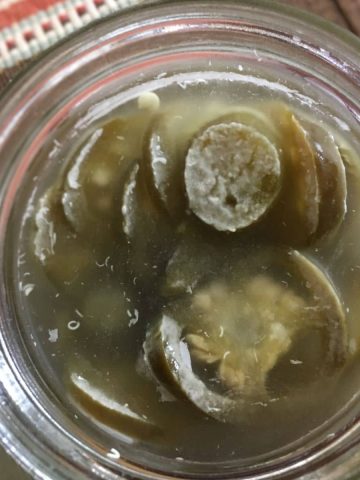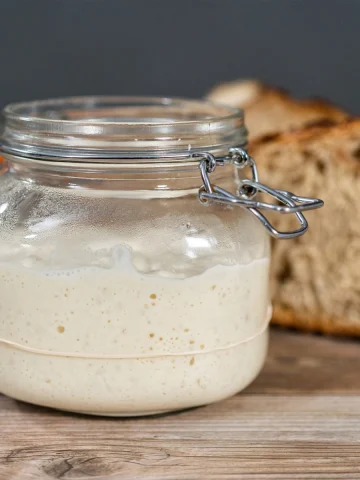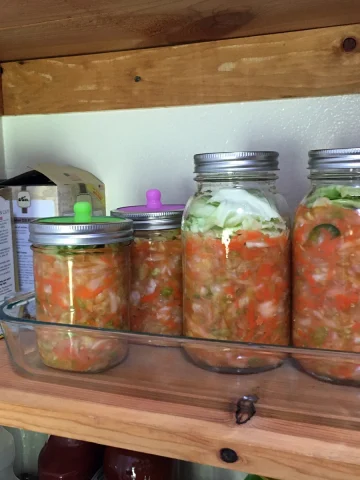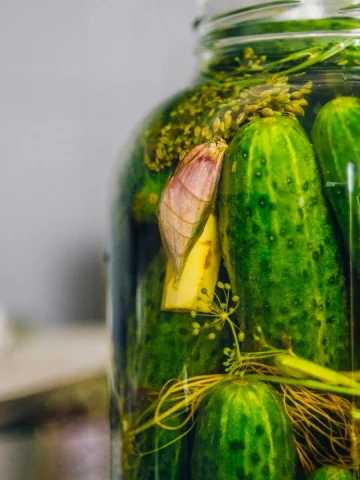Which Plant-Based Foods Have the Probiotics?
Here are the best vegan sources of probiotic gut-healthy foods and why everyone should eat more fermented foods.
Most people think of dairy foods like yogurt and kefir when imagining the best sources of probiotics. And while these foods are excellent for your daily dose of beneficial bacteria, they aren’t suitable for a vegan lifestyle.
Luckily, there are plenty of delicious plant-based fermented foods vegans can turn to to keep their gut health in check. Fermented foods like sauerkraut, tempeh, and kombucha are all great options.
In this article, I’ll offer insight into the best vegan food with probiotics.
What Are Probiotics and Why Are They Important for Vegans?
Probiotics are foods that contain live microorganisms. Regular consumption of probiotic foods is vital for maintaining a healthy gut microbiome.
The good bacteria in probiotic foods will replenish your digestive system and help ward off bad bacteria. (1)
Probiotics are essential for vegans because they help maintain digestive health.
Vegans are more likely to have a higher fiber intake and healthy greens, and having a good gut microbiome can help your digestive system break down plant fibers, absorb nutrients, and give your body energy.
When you eat lots of probiotics or take probiotic supplements, your digestive system can break down food effectively.
You’ll also enjoy the improved immune function and protection against bad bacteria that might try to spread in your digestive system.
Top 8 Vegan Sources of Probiotics
1. Sauerkraut
Sauerkraut is a delicious probiotic food made with fermented cabbage. Sauerkraut is one of the oldest fermented foods in the world and is popularly enjoyed as a condiment in the United States.
Sauerkraut is usually spiced with dill seed, caraway, and juniper berries.
You can make this delicious condiment through traditional fermentation. Many people enjoy allowing the microorganisms naturally found in cabbage to ferment.
Sauerkraut found in stores is often made with starter cultures designed to produce a consistent and flavorful result.
The most significant benefit of eating sauerkraut is that it provides your gut with many beneficial microorganisms. The lactic acid bacteria in sauerkraut are ideal for growing a healthy gut microbiome and warding off harmful bacteria.
Sauerkraut also has plenty of vitamin C, perfect for boosting your immune system.
If you want the maximum benefits from sauerkraut, you should eat around 7 to 10 grams daily — i.e., one tablespoon of kraut.
What's the best Sauerkraut for Probiotics and Gut-health
2. Kimchi
Much like sauerkraut, kimchi is a probiotic food made by fermenting cabbage. The dish originates from Korea and has become extremely popular across the world. Vegan kimchi is seasoned with scallions, ginger, kelp broth, red chili pepper flakes, and garlic.
Animal products are sometimes used for kimchi, but salted shrimp and fish sauce are easily substituted with vegan alternatives.
Kimchi is generally made through a traditional fermentation process. Once the brine, cabbage, and other vegetables are mixed, the kimchi is put in a jar, and the wild microorganisms present are allowed to grow and ferment the mixture.
This food offers plenty of digestive benefits. The high probiotic content in kimchi boosts digestion, replenishes the gut microbiome, and helps people feel healthy and energized.
The antimicrobial properties of kimchi can help your body ward off harmful microbes. Kimchi is also high in iron and choline, which makes it a great addition to a vegan diet.
How much kimchi you should eat varies. Starting with a tablespoon of kimchi daily is great for people not used to eating probiotic foods since it gives your digestive system time to adapt.
Many people in Korea enjoy eating kimchi with at least one meal daily, so you can incorporate more into your diet if you love kimchi!
3. Tempeh
Tempeh is a fermented food made from soybeans. It’s often cooked and used as a protein source in gyros and sandwiches. Some people even break tempeh into small pieces and use it to make sloppy joes or tacos!
Tempeh is made through a strange fermentation process. Much like some cheeses, the process involves using a gut-friendly mold.
The soybeans are partially cooked and allowed to ferment with mycelium mold. The process eventually results in a nutty and savory cake of soybeans.
This fermented food is an excellent addition to any diet because it has zero cholesterol and lots of iron, fiber, and protein.
Tempeh isn’t known to cause bloating, and it’s filled with tons of probiotics that will help your digestive system function properly. The isoflavones in the tempeh can help reduce inflammation in your body.
Incorporating a variety of protein sources into your diet is important. It’s worth noting that tempeh is considered a complete protein, however — so you can get every amino acid necessary to power your body by eating this superfood.
Eating up to three servings daily is a great way to get probiotics and fiber while still leaving room to eat plenty of fruits and vegetables.
4. Miso
Miso paste is an ingredient famously used to make the delicious broth of miso soup. This salty paste is usually made from fermented soybeans.
Some miso is made from other fermented grains, like barley or oats.
The fermentation process starts with koji bacteria. The soybeans or grains, koji bacteria, and salt are mixed and allowed to ferment.
Gradually, fermentation produces the distinct color and flavor that makes miso paste iconic.
Miso is an incredibly healthy addition to a vegan diet. You can get close to ten percent of your daily manganese and vitamin K value with just one ounce of miso paste.
The amount of probiotics in the miso is perfect for balancing your gut bacteria and improving digestive issues.
It’s important not to overeat miso per day since the paste is incredibly high in sodium. Most nutritional experts recommend eating up to one tablespoon of miso paste daily. This will make plenty of broth and nourish your body with beneficial bacteria.
5. Kombucha
Kombucha is a fascinating and ancient fermented drink made from tea. Fermentation involves mixing tea, sugar, and a culture called a SCOBY, which stands for Symbiotic Colony Of Bacteria and Yeast.
Once the kombucha mixture is prepared, it can sit for at least a week and ferment.
The result is slightly fizzy and tangy, making it an excellent healthy replacement for drinks like soda.
The beneficial microbes in Kombucha are excellent for restoring balance in your digestive system. The B vitamins present in Kombucha are also a great addition to a vegan diet.
Most experts recommend drinking eight to sixteen ounces of kombucha daily at maximum. Kombucha is high in calories, caffeine, and sugar; its carbonation can sometimes lead to bloating or discomfort.
Related: Kombucha SCOBY Jerky recipe

6. Natto
Natto is a traditional fermented dish made with soybeans. Rather than forming a solid cake like in tempeh, the soybeans are prepared to have a stringy and sticky texture.
This delicious fermented dish is prepared by allowing B. subtilis bacteria to ferment boiled soybeans. The fermentation is usually completed in rice straw or styrofoam boxes.
Natto is an incredibly nutritious food. Aside from offering lots of protein and fiber, natto is an excellent source of manganese, iron, copper, magnesium, and zinc.
This fermented soybean product is also packed with probiotics. Just 3.5 ounces of natto is enough to nourish you with 20 grams of protein, almost 75% of your daily value of copper, and a healthy dose of beneficial bacteria.
7. Pickles
Pickles are a delicious type of fermented food. They are prepared by allowing cucumbers to ferment in a mixture of salt and water, relying on the same naturally present lactic acid bacteria as sauerkraut and kimchi.
This food is incredibly nutritious. Pickles are a great source of vitamin K and beneficial bacteria.
If you want the probiotic benefits of pickles, it’s essential to make sure you purchase fermented pickles and not vinegar pickles.
Eat one pickle per day for a good dose of probiotics. They’re perfect for adding to dishes like veggie burgers or pasta salad to add some extra tang.
The Best Fermented Pickles You Should Try
8. Vegan Yogurt
Vegan yogurt is a plant-based alternative yogurt made from various grains, nuts, or legumes. Cashew, oat, almond, soy, coconut, and pea-based yogurts are all options.
Artificial whey yogurt may become available as companies like Perfect Day experiment with making animal-free whey through fermentation.
Many vegan yogurt brands are fermented with beneficial bacteria, meaning they can deliver all the same probiotic benefits as dairy.
Verifying that the yogurt is probiotic before you purchase it is essential. Vegan yogurt that contains probiotics will be labeled as containing live and active cultures.
You should eat one serving of vegan yogurt daily to get enough probiotics. Generally, a single-serving cup is a sufficient amount.
If you purchase large tubs of yogurt, follow the advice on the nutrition label to determine the best amount to eat.
How to Make Your own Vegan-Friendly Fermented Foods at Home
There are plenty of plant foods that are natural sources of probiotics. Check out our collection of fermented vegetables and drinks that are all vegan-friendly.
- Fermented fruits and vegetables: such as sauerkraut, juniper & caraway sauerkraut, pickles, carrots, lemons, green beans, jalapenos, mushrooms, and kimchi.
- Fermented soy products: such as tempeh, natto, and miso.
- Grains: such as fermented oats or rice.
- Beverages include water kefir, coconut kefir, kombucha, and Mead, Apple cider mead.
- Condiments: such as fermented ketchup, relish, salsa, or chutneys.
Tips for Incorporating Probiotic-Rich Foods into Your Vegan Diet
You can incorporate probiotic-rich foods into your vegan diet in various ways. Consider making dishes that you can pair with sauerkraut, kimchi, or pickles.
Natto and tempeh can be used as the protein source for many dishes, while miso is an excellent broth. Kombucha, pickles, and yogurt are excellent options for probiotic snacks.
Also, make sure you’re getting the right nutrients. You will enjoy an increased fiber intake, antioxidants, and many other vital nutrients when you're vegan.
Fortified foods like soy milk often help to address any potential deficiencies. But you should always get enough of these nutrients for the best gut health and digestion.
- Vitamin B12. This vitamin is essential for helping your body harness energy from food. Fermented foods, fortified foods, and nutritional yeast are excellent sources of B12.
- Calcium. This mineral is vital for maintaining a healthy gut microbiome. Low-oxalate calcium sources like soybeans and winged beans are great choices.
- Zinc. This mineral is vital for the function of many enzymes involved in digestion. The best vegan sources of zinc are hemp seeds, tahini, sesame seeds, and soybeans.
- Taurine, creatine, carnosine, and choline. These organic compounds all play various roles in digestion. Eating a variety of complete protein sources can aid your body in synthesizing these complex chains of amino acids.
Alternatively, purchase synthetic supplements to boost your intake. - Omega-3 Fatty Acid (DHA). This healthy fat can help improve blood flow, which in turn can aid digestion. Taking an algae DHA supplement is the best way to increase your intake.
Your body can sometimes synthesize DHA using dietary ALA from foods like raw walnuts, seaweed, and canola oil. - Iodine. This mineral is vital for the thyroid, which is essential to your metabolism. Strawberries, cranberries, lima beans, and navy beans are all rich in iodine.
- Vitamin D. This vitamin is essential for helping your body absorb calcium. Get sun to boost your vitamin D, or take a certified vegan supplement.
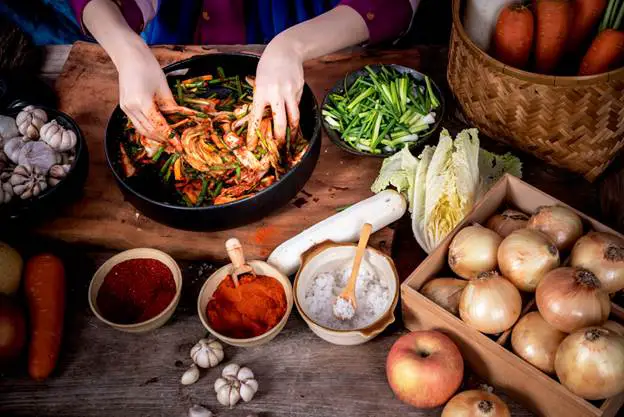
Frequently Asked Questions
What Are Some Common Vegan Sources of Probiotics?
Some common vegan sources of probiotics include plant-based yogurt, pickles, sauerkraut, kimchi, fermented vegetables, natto, kombucha, tempeh, and miso.
How Much Probiotic-Rich Food Do I Need to Eat to See Health Benefits?
Consuming around 1010 (or ten billion) CFUs of probiotics per day is recommended. Many studies suggest that fermented foods like sauerkraut contain up to one billion CFUs per gram, so ten grams (or one tablespoon) of fermented food is a great start.
Of course, you don’t have to strictly measure the probiotic food you’re eating to enjoy health benefits. Many people enjoy significant health benefits by eating one to two servings of probiotic foods daily, regardless of how much a serving of yogurt or kombucha may be.
It’s worth noting that you should stick to simple probiotic foods to enjoy the best health benefits. The cooking process involved with foods like tempeh can sometimes reduce the number of microbes.
Can You Take Probiotic Supplements as a Vegan?
You can take probiotic supplements as a vegan. It’s essential to ensure that your supplement doesn’t contain animal products. Some supplements are made with gelatin capsules. Ingredients used as binders and coatings for tablets are sometimes non-vegan. Here are some ingredients to avoid.
- Carmine and shellac, which are both derived from insects
- Caprylic acid, which is derived from milk
- Look for vegan-friendly certification for magnesium stearate, which may be derived from pork.
- Vitamin D3 may be derived from wool — look for vegan-friendly certification.
Some supplements are produced with animal testing. If you want to ensure your supplement is made without animal testing, shop for a probiotic supplement that is certified vegan-friendly.
Are All Types of Vegan Yogurt Probiotic-Rich?
Not all types of vegan yogurt are probiotic-rich. Only some brands of vegan yogurt are made with healthy bacteria. As a rule of thumb, you should always make sure that the vegan yogurt you purchase is labeled as containing live and active cultures.
Amande, Kite Hill, Forager Project, Coconut Grove, Silk, So Delicious, Nancy’s, Trader Joe’s, and O’ Soy Soy Yogurt are all known to contain probiotics. Recipes can sometimes change, so check the label before purchasing a yogurt.
Can You Get Too Many Probiotics from Food or Supplements?
You can take too many probiotics. As mentioned, probiotics are vital for restoring the correct balance of microbes in your digestive system. If you consume too many probiotics, you can introduce an excessive amount of particular live bacteria strains.
If you consume too many probiotics, you can suffer from uncomfortable digestive systems. Diarrhea, constipation, stomach cramps, nausea, loss of appetite, reduced energy, and poor immune function are all symptoms you can suffer if your gut microbiome is thrown out of balance.

